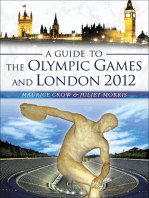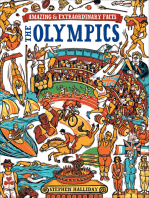Adp H&pe 2nd Semester Ancient Olympics
Adp H&pe 2nd Semester Ancient Olympics
Uploaded by
tehzinaslam9597Copyright:
Available Formats
Adp H&pe 2nd Semester Ancient Olympics
Adp H&pe 2nd Semester Ancient Olympics
Uploaded by
tehzinaslam9597Original Title
Copyright
Available Formats
Share this document
Did you find this document useful?
Is this content inappropriate?
Copyright:
Available Formats
Adp H&pe 2nd Semester Ancient Olympics
Adp H&pe 2nd Semester Ancient Olympics
Uploaded by
tehzinaslam9597Copyright:
Available Formats
ADP H&PE 2ND SEMESTER
Composed by Tehzin Aslam Khan Lecturer in Physical Education GACW
JANDANWALA
ANCIENT OLYMPICS
The first ancient Olympic Games took place almost 2,800 years ago in the town of
Olympia. They were the oldest, and largest, of the four PanHellenic Games - four
separate sports festivals held in ancient Greece.The Olympics became an integral part
of ancient Greek society. Every four years from 776 BC to 393 AD, thousands of
people from all over the Greek world congregated for the competition. The event was
so popular, that when the Persians invaded in the summer of 480 BC,the allied Greek
city states had to delay military preparations as so many men were at the Olympics!
But unlike the modern Olympics, there was no torch relay, no female competitors, and
events would often become brutal.
Below, we take a look at interesting Ancient Olympics facts:
1 - The ancient Olympic stadium
The Olympics were named after Mount Olympus, but they were actually held in the rural
sanctuary of Olympia, in Greece’s western Peloponnese region. It was a hugely sacred area,
featuring picturesque olive tree plantations and a giant statue of the god Zeus.
By the second century BC,the main stadium held approximately 45,000 people, who stayed in
tents around the building.
2: Origin of the Olympic Games
There is some historical dispute over the reason behind the ancient Olympics.
One theory is that it was a festival in honour of Zeus. This would help explain why it was
named after Mount Olympus - where the Greek gods were said to have lived.
However, some historians believe that the ancient Olympics were actually funeral games held
in honour of deceased local heroes.
During the festival, a vast number of oxen were sacrificed in honour of Zeus.After a small
part of each animal was burned for the god,the rest of the meat was consumed by the people
at a grand banquet.
3 - An Olympic Truce between Greek city states
Prior To the Games, messengers called ‘spondophoroi’ were sent out across the Greek world
to announce the Olympic Truce or Ekecheiria’.
Each participating city-state had to sign up to the truce, which meant that no war was
permitted and no arms could be carried into Olympia.
This in turn facilitated the safe passage of athletes and spectators travelling to the festival.
Initially,the truce was for one month but it was later extended to three.
4 - Who could take part?
All free male Greek citizens were entitled to participate in the ancient Olympic Games,
regardless of their social status. Several emperors even took part.
Women were not allowed to compete, but unmarried women could attend, with exceptions
like Kyniska, who won in equestrian events as a horse owner and the priestess of
Demeter, goddess of fertility, was given a privileged position next to the Stadium
altar.
Anyone was allowed to own a horse and Kyniska, daughter of King Archidamos of Sparta,
subsequently became the first female Olympic victor in Antiquity. Her four horses won in the
396BC and 392BC Olympiads.
A separate festival called the Heraean Games, dedicated to the goddess and wife of Zeus,
Hera, was created for women.
These Games were also held in Olympia, and featured young girls competing in a footrace on
a track one sixth shorter than the men’s equivalent.
5: Olympics Events
For The first 12 ancient Olympics,the only event was a short footrace of about 190m - or one
length of the stadium - called a ‘stade’.
Eventually,the Games expanded from one day to five, as a total of 18 events were added to
the programme.
The earliest additions were running events of different lengths, as well as wrestling,
pentathlon, boxing and for the wealthiest competitors, chariot racing.
Like it’s modern equivalent,the ancient pentathlon included five different events.These were
the discus, long jump (using weights from a standing jump), javelin, running, and wrestling.
Among the various horse races was the ‘kalpe’ where the rider would jump off their mare
and run alongside them for the last lap.
Each event was intended to train men for war, which was perhaps best personified by the
‘hoplitodromos’ race, where athletes had to complete between two and four lengths of the
stadium wearing a full set of hoplite armour.
The most brutal sport was ‘pankration’.This event was a combination of wrestling and
boxing, where neck holds and strangling were permitted, and only biting and eye-gouging
were forbidden.Athletes could resign through waving a finger in the contact sports, but death
was still commonplace.
The Michael Phelps of the ancient Olympics was undoubtedly Leonidas of Rhodes. The
runner won a total of 12 titles across four-consecutive Olympiads (164-152 B.C.) and was
hailed as a hero among men.
6 - Physical punishment for breaking the rules
The ancient Greeks didn’t rely on good will to ensure fair competition during this often brutal
period in history.
Athletes who broke rules during the Olympics were publicly whipped. Whether it was a foul
move in wrestling, or a false start in running, officials called ‘alytes’ had the power to punish
any competitor they felt was trying to gain an unfair advantage.A lack of courage was also
highly frowned upon, and there was even an athlete that was fined for cowardice after
backing out of a competition.
7 - Athletes competed naked
There are thought to be several reasons from this, ranging from a tribute to Zeus - whom
they wanted to show their physical power- to drawing a distinction between themselves and
their barbarian enemies, who were afraid to show their bodies.
Whichever it was, nudity was a fundamental part of ancient Greek culture, and the athletes
would show off their physiques during parades in the stadium.
In addition, wrestlers also covered their bodies in oil to keep sand out of their pores, before
dusting themselves with a fine powder to ensure they could be gripped.
Men would also work out in the buff, and the word ‘gymnasium’ actually comes from the
Greek word ‘gymnos’, meaning naked.
8: The winners
There were no gold, silver, and bronze medals on offer at the ancient Games.
In fact, prizes were awarded only to the winners, which began with a wreath made from the
leaves of the sacred olive trees at Olympia.
Victors were also allowed to erect a statue of themselves in the sacred Altis grove - the
sanctuary of the Gods - at Olympia.
‘Odes’ were dedicated to the first-place finishers by famous poets, which would be performed
when the athlete arrived back in his home state.
Downfall of Ancient Olympics
1: The ancient Olympic Games officially came to an end around 394 AD, when Roman
emperor Theodosius I outlawed pagan celebrations to promote Christianity.
2: The Olympic games continued for many years with much enthusiasm and zeal, and people
in large numbers used to participate in them. But when people from outside Greece began to
take part, the people forgot the spirit of the amateur and turned professionals. These people
then made the victory in the games their sole motive.
3: One of the reasons for the decline of these games was the Roman victory over Greece. The
decline started because the Romans were not very enthusiastic about these games.
4: Many evils cropped up in the games. People began to bribe the judges in order to win.
Then some such events came to be included in the Olympics that caused the death of one or
the other player everyday. In games like boxing players began to hold iron pieces in their
hands which would prove very injurious or fatal, thereby discouraging the honest people from
taking part in such games.
5: In 394 A.D. These games were banned on the orders of the Roman Emperor Theodosius.
The contribution of the Greeks in the sports field was, thus, put to an end. The stadiums and
temples where life buzzed with activity turned into ruins, and revealed the decline of the
Olympic games.
The first modern Olympic Games took place 1503 years later, at Athens in 1896.
You might also like
- Gaso Transport Services V Obene Ealr 1990-1994 Ea 88Document12 pagesGaso Transport Services V Obene Ealr 1990-1994 Ea 88Tumuhaise Anthony Ferdinand100% (1)
- The Story of The Olympic GamesDocument19 pagesThe Story of The Olympic Gamesmilanko8ratkovi8100% (2)
- The Conspiracy To Destroy All Existing Governments and Religions - Carr (1958)Document58 pagesThe Conspiracy To Destroy All Existing Governments and Religions - Carr (1958)Abanoub100% (3)
- History of The First Ancient Olympic GamesDocument6 pagesHistory of The First Ancient Olympic GamesDon J Asuncion100% (1)
- Camp John Hay Devt Corp v. Charter Chemical and Coating Corp.Document2 pagesCamp John Hay Devt Corp v. Charter Chemical and Coating Corp.JcNo ratings yet
- Origin and Historical Evolution of Sports As A Common European Cultural Activity Author European CommissionDocument41 pagesOrigin and Historical Evolution of Sports As A Common European Cultural Activity Author European CommissionShinbeeNo ratings yet
- The Olympic Games of The AntiquityDocument3 pagesThe Olympic Games of The AntiquityRishu SinghNo ratings yet
- History of Athletics and Olympic GamesDocument33 pagesHistory of Athletics and Olympic GamesNadine RevillaNo ratings yet
- ESSAYDocument2 pagesESSAYЈефимија ЈовановићNo ratings yet
- The OlympicsDocument5 pagesThe OlympicsDrago ŠarićNo ratings yet
- British Museum Olympic GamesDocument9 pagesBritish Museum Olympic GameslosplanetasNo ratings yet
- Olympic GamesDocument3 pagesOlympic Gamesapi-291662375No ratings yet
- The Ancient Greek OlympicsDocument8 pagesThe Ancient Greek Olympicshenrymcdonald744No ratings yet
- Health Education 04012017Document50 pagesHealth Education 04012017Vignesh CoolNo ratings yet
- The Ancient OlympicsDocument34 pagesThe Ancient Olympicsmilanko8ratkovi8No ratings yet
- Jocurile Olimpice Jocurile OlimpiceDocument34 pagesJocurile Olimpice Jocurile OlimpiceLigia-Ioana DancusNo ratings yet
- British Museum Olympic GamesDocument9 pagesBritish Museum Olympic GamesadimarinNo ratings yet
- Atletics For Self Discipline: Reporter: Rolando L. Bautista Jr. Ms. Jessica SantosDocument11 pagesAtletics For Self Discipline: Reporter: Rolando L. Bautista Jr. Ms. Jessica Santoscarmi_cute7No ratings yet
- Ancient Olympic GamesDocument3 pagesAncient Olympic GameskariricalebNo ratings yet
- Every School Going Kid Knows Olympics OriginatedDocument95 pagesEvery School Going Kid Knows Olympics OriginatedBESTLOVERNo ratings yet
- Origin of OLYMPIC GamesDocument2 pagesOrigin of OLYMPIC GamesAnkita JainNo ratings yet
- Lesson 1 Olympic GamesDocument10 pagesLesson 1 Olympic GamesDyriane PagsolinganNo ratings yet
- The Oldest Myth Which Concerns The Beginning of The Olympic Games Is That of Idaios Daktylos HeraklesDocument4 pagesThe Oldest Myth Which Concerns The Beginning of The Olympic Games Is That of Idaios Daktylos HeraklesLBORSI19100% (1)
- Tugas Tutorial 1 Reading 1Document3 pagesTugas Tutorial 1 Reading 1yomiutamiiNo ratings yet
- History of OlympicsDocument15 pagesHistory of OlympicsLalit VarmaNo ratings yet
- The Story of The Olympic GamesDocument19 pagesThe Story of The Olympic GamescocopollyNo ratings yet
- Olympic Games Second Sem123Document67 pagesOlympic Games Second Sem123hoohooNo ratings yet
- Olympics in GreeceDocument10 pagesOlympics in Greeceapi-26416904No ratings yet
- History of Olympic GamesDocument12 pagesHistory of Olympic GamesPrashant KulkarniNo ratings yet
- TextDocument1 pageTextdeliachelsea10No ratings yet
- The Story of The Olympic GamesDocument19 pagesThe Story of The Olympic GamesEvelinaNo ratings yet
- THE OLYMPIC GAMES + TraduccióDocument6 pagesTHE OLYMPIC GAMES + TraduccióMargalida SociasNo ratings yet
- Olympic GamesDocument2 pagesOlympic GamesMelisa FaveroNo ratings yet
- CLC Olympic GamesDocument7 pagesCLC Olympic Gamesapi-620479772No ratings yet
- THE PRECURSORS OF THE MODERN OLYMPICS by Nicholas PappasDocument21 pagesTHE PRECURSORS OF THE MODERN OLYMPICS by Nicholas PappasNicholas PappasNo ratings yet
- Olympic GamesDocument7 pagesOlympic GamesMarc Daniel ManlangitNo ratings yet
- Sports of The Ancient Mediterranean WorldDocument39 pagesSports of The Ancient Mediterranean WorldJericho DejoyaNo ratings yet
- OriginDocument4 pagesOriginShaunmoss SiankopeNo ratings yet
- The History of The Games Reading ComprehensionDocument18 pagesThe History of The Games Reading ComprehensionNandana RajeevNo ratings yet
- Historical Backround of AthleticsDocument4 pagesHistorical Backround of AthleticsJessa May RapadasNo ratings yet
- Ancient Olympic Games and Modern Olympic GamesDocument39 pagesAncient Olympic Games and Modern Olympic Gamesmuhammad Anaqi100% (2)
- Olympic History: by Unknown Author Is Licensed UnderDocument5 pagesOlympic History: by Unknown Author Is Licensed UnderAL FirdausNo ratings yet
- Worksheet 1. Read The Article About The Ancient Olympic Games. Then Review The Glossary and Complete The Exercises That Follow ItDocument2 pagesWorksheet 1. Read The Article About The Ancient Olympic Games. Then Review The Glossary and Complete The Exercises That Follow ItabdíashNo ratings yet
- Physical Education 3 PDFDocument67 pagesPhysical Education 3 PDFNadine RevillaNo ratings yet
- Hm1 (Macro) TextDocument2 pagesHm1 (Macro) TextTrishNo ratings yet
- Ancient Olympic Games - WikipediaDocument19 pagesAncient Olympic Games - WikipediaJames FranklinNo ratings yet
- Docs DDocument12 pagesDocs DJobelle RafaelNo ratings yet
- Podcasts - Themes - The Olympic GamesDocument3 pagesPodcasts - Themes - The Olympic Gamesk_iribarNo ratings yet
- History of Olympic GamesDocument19 pagesHistory of Olympic Gamesemma.amosNo ratings yet
- The OlympicsDocument2 pagesThe OlympicsAgnesHoneyNo ratings yet
- CLC Olympic Games Questions Thomas and JesperDocument8 pagesCLC Olympic Games Questions Thomas and Jesperapi-556082157No ratings yet
- Indian Medal Winner in OlympicDocument4 pagesIndian Medal Winner in OlympicengghomNo ratings yet
- Eşqin Ingilis DiliDocument5 pagesEşqin Ingilis DiliEsqin AliyevNo ratings yet
- Lampasa, Lucia: History of Track and FieldDocument5 pagesLampasa, Lucia: History of Track and FieldRuby ComedaNo ratings yet
- The Olympic GamesDocument1 pageThe Olympic GamesSliusar OksanaNo ratings yet
- Form 4 Ancient & Modern Olympic GamesDocument26 pagesForm 4 Ancient & Modern Olympic GamesSHC PE & SportNo ratings yet
- OlympicsDocument29 pagesOlympicsfakearavyascribd1No ratings yet
- Olympic GamesDocument46 pagesOlympic Gamesamity2001No ratings yet
- Olympic GamesDocument16 pagesOlympic GamesIshmeet SinghNo ratings yet
- G&U S SetBU26Document53 pagesG&U S SetBU26Limos LmaNo ratings yet
- Filing Fee As Lien On The JudgmentDocument2 pagesFiling Fee As Lien On The JudgmentFrancesco Celestial BritanicoNo ratings yet
- Motor Vehicle Insurance Act 48.51Document41 pagesMotor Vehicle Insurance Act 48.51Kishion GittensNo ratings yet
- Uterine FibroidsDocument11 pagesUterine Fibroidsapi-3705046No ratings yet
- Lumauig vs. PeopleDocument2 pagesLumauig vs. PeopleAnne Kerstine BastinenNo ratings yet
- CAP Form 2a - Oct 2008Document2 pagesCAP Form 2a - Oct 2008CAP History LibraryNo ratings yet
- Market Basket Case StudyDocument8 pagesMarket Basket Case Studyapi-528610524No ratings yet
- DOJ Brief On 764 and DensmoreDocument31 pagesDOJ Brief On 764 and DensmoreKen SilvaNo ratings yet
- Design Transfer Agreement 781711 en USDocument3 pagesDesign Transfer Agreement 781711 en USAditia Ramdhan AlkausarNo ratings yet
- (Template) News Sharing FormDocument2 pages(Template) News Sharing FormItzz ReldNo ratings yet
- Fox News PollDocument3 pagesFox News PollowineNo ratings yet
- JB 323 - Pacific 22Document1 pageJB 323 - Pacific 22Leo ChalimNo ratings yet
- Gun Carriage Factory Jabalpur: Presented ByDocument17 pagesGun Carriage Factory Jabalpur: Presented Byparag_mitNo ratings yet
- Two One Act PlaysDocument3 pagesTwo One Act PlaysMohammad UmairNo ratings yet
- First Ecumenical Council - Nicaea IDocument4 pagesFirst Ecumenical Council - Nicaea Ik_shinkNo ratings yet
- Meer FoundationDocument22 pagesMeer FoundationnikhilNo ratings yet
- Anglo-Saxons 2.1 (Grade 5 History)Document18 pagesAnglo-Saxons 2.1 (Grade 5 History)JoannaNo ratings yet
- Buan V Lopez-Civ Pro-Rd1Document1 pageBuan V Lopez-Civ Pro-Rd1cmv mendozaNo ratings yet
- CULT OF THE 1ST AMENDMENT: WHY CHRISTINE BLASEY FORD'S HIGH SCHOOL YEARBOOKS WERE SCRUBBED: Faculty Approved Racism, Binge Drinking and Promiscuity PDFDocument44 pagesCULT OF THE 1ST AMENDMENT: WHY CHRISTINE BLASEY FORD'S HIGH SCHOOL YEARBOOKS WERE SCRUBBED: Faculty Approved Racism, Binge Drinking and Promiscuity PDFMark KinoNo ratings yet
- Department of Central Bureau of InvesticationDocument3 pagesDepartment of Central Bureau of Investicationsyed nemath miyaNo ratings yet
- Imbusch Misse & Carrión Violence Research in Latina America A Literature ReviewDocument68 pagesImbusch Misse & Carrión Violence Research in Latina America A Literature ReviewIvan PojomovskyNo ratings yet
- CIR Vs PNBDocument9 pagesCIR Vs PNBDenise Michaela YapNo ratings yet
- Life and Works of Francisco de GoyaDocument2 pagesLife and Works of Francisco de GoyaAudsNo ratings yet
- In Re Vicente SottoDocument2 pagesIn Re Vicente SottoJimi Solomon100% (1)
- SlashDocument4 pagesSlashnimfeoNo ratings yet
- 2024.03.29 Letter To Justice MerchanDocument2 pages2024.03.29 Letter To Justice MerchanKaelan DeeseNo ratings yet
- Captive Maternal and Abolitionism J JamesDocument16 pagesCaptive Maternal and Abolitionism J JamesDinara CarvalhoNo ratings yet

























































































